|
__________________________________________________________________
Supporting Maine Veterans as they Transition to Civilian Life
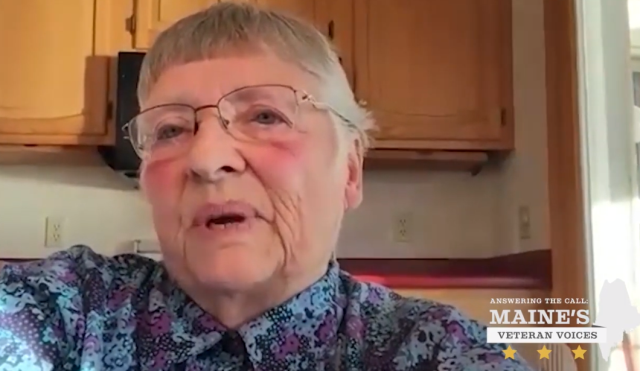
In November we celebrated Veterans Day, a time when we honor the Soldiers, Sailors, Airmen, Marines, Guardians, and Sentinels who served our nation. This Veterans Day, I had the privilege of speaking with Beth Parks of Corea, a Vietnam War nurse turned trailblazing wildlife biologist. Her story is incredible and I hope you'll take some time to listen to it for yourself in my latest episode of "Answering the Call: Maine's Veteran Voices."
Beth and the brave men and women who answered the call to serve represent the very best of our nation and we owe it them to them to serve them as they have served us — especially as they enter the next chapter of their lives after retiring from the service. Every year approximately 200,000 servicemembers transition out of military service into civilian life. Whether the servicemember is finishing their first deployment or retiring, transitioning back into civilian life is a major life event full of uncertainties. After years of structure and order, the transition to the civilian world can feel like a difficult journey without a game plan.
In October, the Senate Veterans Affairs Committee and the Senate Armed Services Committee held a joint hearing, one that I requested, to ensure federal agencies work together to ensure a smooth transition and “warm hand-off” as servicemembers transition to civilian life. For example, many servicemembers have specialized job skills from their roles in the military that can be easily transferred to the civilian workforce. When agencies work together to remove red tape, veterans will face fewer barriers to employment in the civilian job market — especially at a time when there are workforce shortages across the country.
I also led a letter alongside my Republican colleague from Louisiana, Senator Bill Cassidy, urging the Department of Labor to allow transitioning servicemembers to be eligible for the Jobs for Veterans State Grant (JVSG). Not only would this change allow servicemembers to get connected with quality jobs after their service concludes, it would also help bolster the civilian workforce with highly skilled veterans. It's a win-win.
So, it's simple: we need to make sure our veterans have easy access to the benefits they deserve and provide them with opportunities to land a good paying civilian job — all before leaving the service. Thanks to our servicemembers and veterans, we get to enjoy the American way of life. Now it’s up to all of us to return the favor.
Strengthening Maine's Forestry Industry

The Maine forestry industry is not only inseparable from our history and culture, it is also foundational to our state's economy — supporting nearly 14,000 jobs across the state. As the industry continues to evolve, we must ensure our forestry workforce has the proper training and skills to help responsibly manage our forests while growing our local economies.
In October, I introduced the bipartisan Jobs in the Woods Act which would make substantial investments to support new and innovative workforce programs in the timber industry. This bill will help Maine people get good, quality jobs and secure the future of our state’s timber industry.
We also need to make sure we're responsibly tracking the health of our forests and preparing for a prosperous future. That’s why I introduced the bipartisan Timber Innovation Act for Building Rural Communities Act. This bill would require the United States Department of Agriculture to establish carbon impact monitoring and would set up grant programs designed specifically to support Maine wood product businesses.
In November, my colleagues and I wrote a letter urging the Government Services Agency to incorporate more mass timber products into federal construction and renovation projects. The use of mass timber products would help to reduce the carbon footprint, increase the resiliency of federal buildings, curb waste and construction costs, and further support Maine's forestry industry.
The forestry industry supports the livelihoods of many Maine families — and is a point of pride for those who have passed down the trade from generation to generation. We need to make sure our forestry workers have the proper training and skills to help responsibility manage our forests, as well as ensure the health of all forests across our state.
_______________________________________________________________________
Advocating for Maine Businesses

When a consumer sees a 'Made in the USA' label, they know they're purchasing a high-quality product and supporting American jobs. But under current conditions, businesses that make their products in the U.S. face a patchwork of different state laws. These differences in state regulations can be confusing and have prevented some American manufacturers from using the labels, threatening the economic livelihood of local businesses and making it harder for consumers to make well-informed purchases.
So, I teamed up with my Republican colleague Senator Mike Lee from Utah to introduce the Reinforcing American-Made Products Act. This bipartisan bill would ensure that the 'Made in the USA' label is a simple, straightforward way to help consumers make informed decisions about the products they buy. We need to make sure we're cutting red tape and streamlining the process so American businesses, workers and consumers can succeed.
And in November, ahead of a busy winter tourism season, I was excited to announce alongside Senator Collins that an additional 64,000 non-agriculture H-2B visas will be made available. These visas are a welcome relief for small businesses throughout Maine that continue to face a shortage of employees and will ensure they are able to meet the increasing demand for their products and services — creating a lifeline for our state economy.
Highlighting Cybersecurity Awareness Month
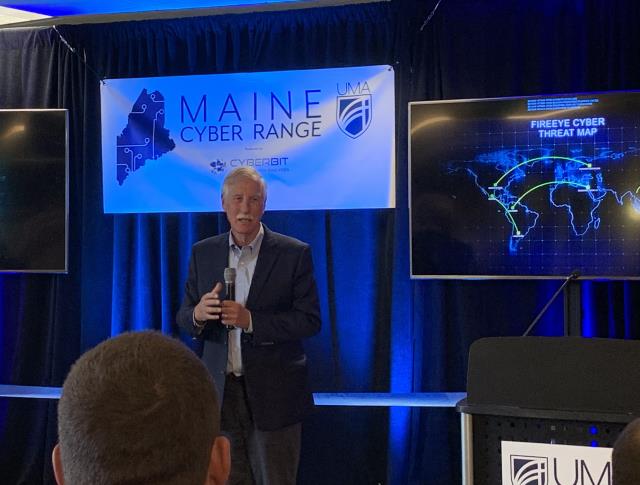
In the 21st century, we’ll continue to become more interconnected — creating incredible new opportunities, and serious new vulnerabilities, so it is imperative that Maine people prepare to face these new challenges. The threats are serious, so our response must be as well.
Since 2004, October has been recognized as Cybersecurity Awareness Month — a month dedicated to the public and private sectors working together to raise awareness about the importance of cybersecurity. As we continue to become more interconnected online, we need to be extra diligent in making sure we are safe and secure online.
For October's "Inside Maine," podcast, I sat down with Jen Easterly, the U.S. Director of the Cybersecurity and Infrastructure Security Agency (CISA), and Dr. Henry Felch, the Program Coordinator for the Cybersecurity program at the University of Maine Augusta on my 'Inside Maine' podcast to highlight the importance of Cybersecurity Month and what we can do in Maine to protect ourselves.
While online threats are always evolving, you can help ‘Secure Our World’ by adopting four simple steps stay safe online: use strong passwords; turn on multifactor authentication; recognize and report phishing and scams; and update software.
You can listen to the episode of my podcast here.
Happenings Around Town
From hosting a Capitol Classes with brilliant students all across Maine to kicking off a new partnership with our friends up in Canada, it's been a busy both in Maine and in Washington!
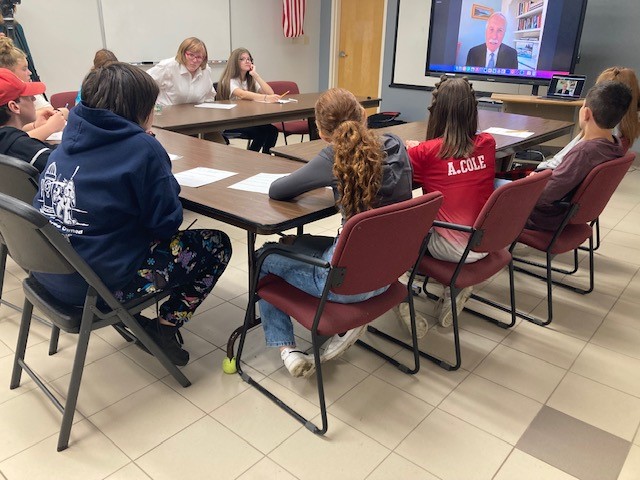
Spending time with Fort Fairfield Middle High School students for Capitol Class
One of the best parts of the job is when I get to teach a Capitol Class with students in Maine. In both October and November, I joined three different schools across Maine to talk about the role of Congress, what a day in the life of Senator looks like and other important news of the day. From Lewiston High School to Yarmouth High School to Fairfield Middle High School, I had the best time engaging with our bright young Maine students and was so impressed by their fantastic questions.

Accepting the Navy League Capital Council Award, a binnacle that served on the Sioux Falls Victory battleship in WWII, Korea and Vietnam
On Capitol Hill, I was honored by the Navy League Capital Council as the 2023 recipient of its Congressional Sea Services Award. It was such an honor to receive this award and I was proud to accept it on behalf of Maine's sailors, sentinels and shipbuilders who work together to protect and secure our waters.
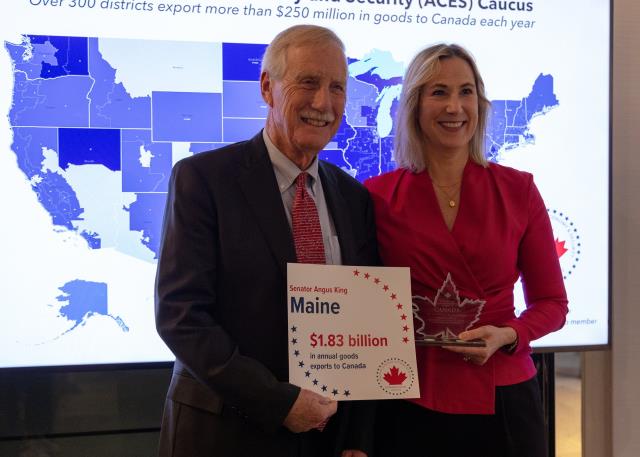
Celebrating the launch of the American Canadian Economy and Security (ACES) Caucus
Maine has always had a strong relationship with our neighbors in Canada. It’s important to me that we work to further strengthen this relationship — the success of both of our countries are closely tied with millions of jobs and goods crossing our borders. That's why I joined my colleagues on both sides of the aisle to start the the American Canadian Economy and Security (ACES) Caucus. Our common values allow us to work together on key national security issues in defense of North America.
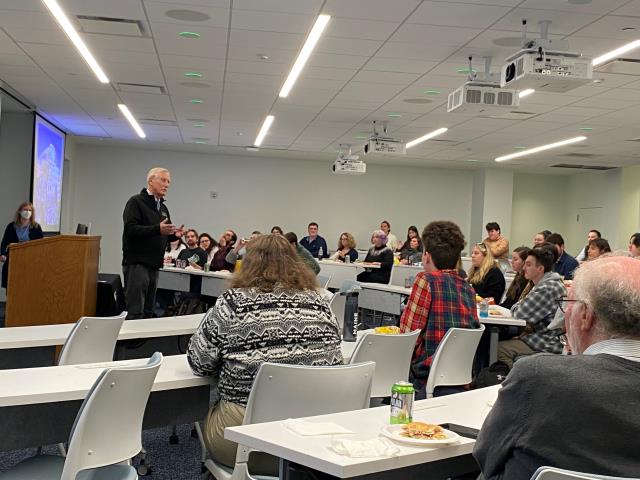
Speaking with students at the University of Maine Law School in Portland
A strong civics education is foundational to continuing our nation’s promise to keep working toward a ‘more perfect union.’ In October, I had the opportunity to stop by the University of Maine Law School in Portland and talk with students about the important role our Constitution plays as a blueprint for freedom and democracy — not just here at home but across the globe.
October and November Policy Update
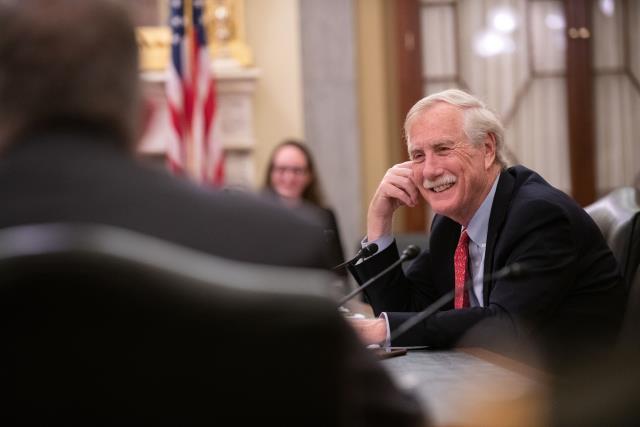
As a reminder, you can read more on my regularly updated press release page at king.senate.gov. Here are some other priorities I’ve been working on.
- Improving Access to Local Journalism. My colleagues and I wrote a letter to the FCC urging the agency to improve access to local media. The shift from broadcast, cable and satellite to streaming has had a profound impact on existing laws, regulations and agreements. This letter urges the FCC to promote the viability of local broadcast stations and localism. Read more HERE.
- Strengthening Ties with Iceland. The Nordic Trader and Investor Parity Act is a bipartisan bill to expand and improve economic ties with Iceland. Currently, Icelanders are not eligible for economic visas to visit and conduct business in the United States, one of the only Arctic nations whose residents face such a barrier. Read more HERE.
- Supporting Healthy Childhoods. I worked with Senator Lisa Murkowski to introduce the bipartisan Preventing Adverse Childhood Experiences (PACE) Act. This bill would authorize grants to public health entities for the prevention of negative events during childhood like violence, abuse or neglect. Read more HERE.
- Encouraging Ranked Choice Voting. Alongside my colleague, Senator Michael Bennet, I introduced legislation to incentivize states to adopt Ranked Choice Voting (RCV) for federal elections. RCV is the fastest growing election reform in the nation and here in Maine we are leading the way. Read more HERE.
- Cutting Energy Costs Ahead of Winter. I joined my colleagues in a bipartisan letter calling on the Biden Administration to help lower energy costs ahead of the winter season. More than 45,000 Maine households have benefited from the Low-Income Home Energy Assistance Program (LIHEAP) and the need still exists. Read more HERE.
Hearing Highlights
We’ve had a busy month of hearings in the Senate Armed Services, Veterans’ Affairs and Intelligence Committees. Here are some of the highlights:
Earlier this year, upon receiving my assignment to the Senate Veterans' Affairs Committee (SVAC), I requested a joint hearing of SVAC and the Senate Armed Services Committee (SASC) to discuss a “warm hand-off” between the agencies from active duty to veteran status. This month, during the joint hearing, we brought in experts to discuss how we can best help our servicemembers transition smoothly into civilian life.
As Chair of the Strategic Forces Subcommittee, I was excited to learn earlier this month that the Congressional Commission on the Strategic Posture of the United States released its final unclassified report. During the subcommittee hearing, we dug into the report's findings to gain greater insight into how we can best defend ourselves against our adversaries.
In The News
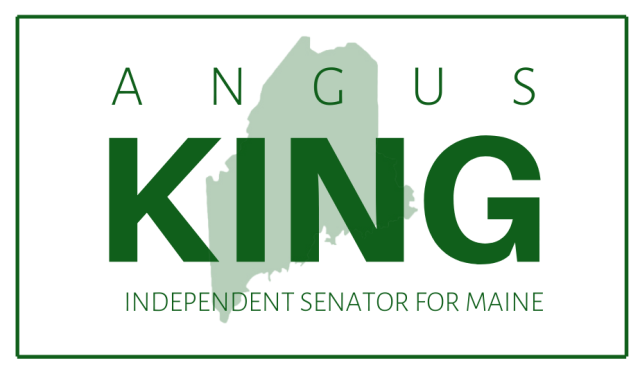
Thanks for subscribing to my monthly newsletter! I would love to hear your ideas for how we can make Maine and our country a better place. Please feel free to reach out with any questions, comments, or concerns by visiting: https://www.king.senate.gov/contact –we look forward to hearing from you.
All the best!

To unsubscribe to this e-Newsletter click HERE.
|